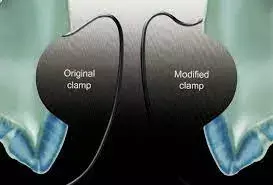- Home
- Medical news & Guidelines
- Anesthesiology
- Cardiology and CTVS
- Critical Care
- Dentistry
- Dermatology
- Diabetes and Endocrinology
- ENT
- Gastroenterology
- Medicine
- Nephrology
- Neurology
- Obstretics-Gynaecology
- Oncology
- Ophthalmology
- Orthopaedics
- Pediatrics-Neonatology
- Psychiatry
- Pulmonology
- Radiology
- Surgery
- Urology
- Laboratory Medicine
- Diet
- Nursing
- Paramedical
- Physiotherapy
- Health news
- Fact Check
- Bone Health Fact Check
- Brain Health Fact Check
- Cancer Related Fact Check
- Child Care Fact Check
- Dental and oral health fact check
- Diabetes and metabolic health fact check
- Diet and Nutrition Fact Check
- Eye and ENT Care Fact Check
- Fitness fact check
- Gut health fact check
- Heart health fact check
- Kidney health fact check
- Medical education fact check
- Men's health fact check
- Respiratory fact check
- Skin and hair care fact check
- Vaccine and Immunization fact check
- Women's health fact check
- AYUSH
- State News
- Andaman and Nicobar Islands
- Andhra Pradesh
- Arunachal Pradesh
- Assam
- Bihar
- Chandigarh
- Chattisgarh
- Dadra and Nagar Haveli
- Daman and Diu
- Delhi
- Goa
- Gujarat
- Haryana
- Himachal Pradesh
- Jammu & Kashmir
- Jharkhand
- Karnataka
- Kerala
- Ladakh
- Lakshadweep
- Madhya Pradesh
- Maharashtra
- Manipur
- Meghalaya
- Mizoram
- Nagaland
- Odisha
- Puducherry
- Punjab
- Rajasthan
- Sikkim
- Tamil Nadu
- Telangana
- Tripura
- Uttar Pradesh
- Uttrakhand
- West Bengal
- Medical Education
- Industry
Longer polymerization time tied to better long-term restoration retention in non-carious cervical lesions

Longer polymerization time tied to better long-term restoration retention in non-carious cervical lesions suggests a new study published in the Journal of Dentistry.
A study was done to evaluate the effect of prolonged (P) polymerization time of a universal adhesive system applied in etch-and-rinse (ER) or self-etch (SE) strategies on the clinical performance of restorations in non-carious cervical lesions (NCCLs), after 36 months of clinical service. A total of 140 restorations were randomly placed in 35 subjects according to the polymerization time groups: ER (10 s); ER-P (40 s); SE (10 s); and SE-P (40 s) at 1,200 mW/cm2. Composite resin was placed incrementally. The restorations were evaluated immediately and after 6, 12, 18, and 36 months using the FDI criteria. Data were analyzed using the Kaplan-Meier survival test for retention loss, and the Kruskal-Wallis’ test for secondary outcomes (α = 0.05). Results: After 36 months, 19 restorations were lost: ER 6, ER-P 2, SE 9, SE-P 2. The retention rates were 82.3% for ER; 94.1% for ER-P; 73.5% for SE; and 94.1% for SE-P, with a significant difference between ER vs. ER-P and SE vs. SE-P, as well as ER vs. SE-P and ER-P vs. SE (p < 0.0001). Minor defects were observed in 18 restorations for the marginal staining criteria: ER 5, ER-P 2, SE 8, SE-P 3; and in 33 restorations for the marginal adaptation criteria: ER 11, ER-P 4, SE 12, and SE-P 6 (p > 0.05). No restorations showed a recurrence of caries or postoperative sensitivity. A prolonged polymerization time of 40 seconds improves the clinical performance of the universal adhesive for both adhesive strategies evaluated, even after 36 months. Prolonging the polymerization time of a universal adhesive from 10 s to 40 s has been shown to improve its clinical performance when used in NCCLs.
Reference:
Romina Ñaupari-Villasante, André de Freitas, Viviane Hass, Thalita P. Matos, Sibelli O. Parreiras, Alessandra Reis, Mario F. Gutiérrez, Alessandro D. Loguercio. Prolonged polymerization of a universal adhesive in non-carious cervical lesions: 36-month double-blind randomized clinical trial. Journal of Dentistry, 2023, 104823, ISSN 0300-5712. https://doi.org/10.1016/j.jdent.2023.104823.
Dr. Shravani Dali has completed her BDS from Pravara institute of medical sciences, loni. Following which she extensively worked in the healthcare sector for 2+ years. She has been actively involved in writing blogs in field of health and wellness. Currently she is pursuing her Masters of public health-health administration from Tata institute of social sciences. She can be contacted at editorial@medicaldialogues.in.
Dr Kamal Kant Kohli-MBBS, DTCD- a chest specialist with more than 30 years of practice and a flair for writing clinical articles, Dr Kamal Kant Kohli joined Medical Dialogues as a Chief Editor of Medical News. Besides writing articles, as an editor, he proofreads and verifies all the medical content published on Medical Dialogues including those coming from journals, studies,medical conferences,guidelines etc. Email: drkohli@medicaldialogues.in. Contact no. 011-43720751


